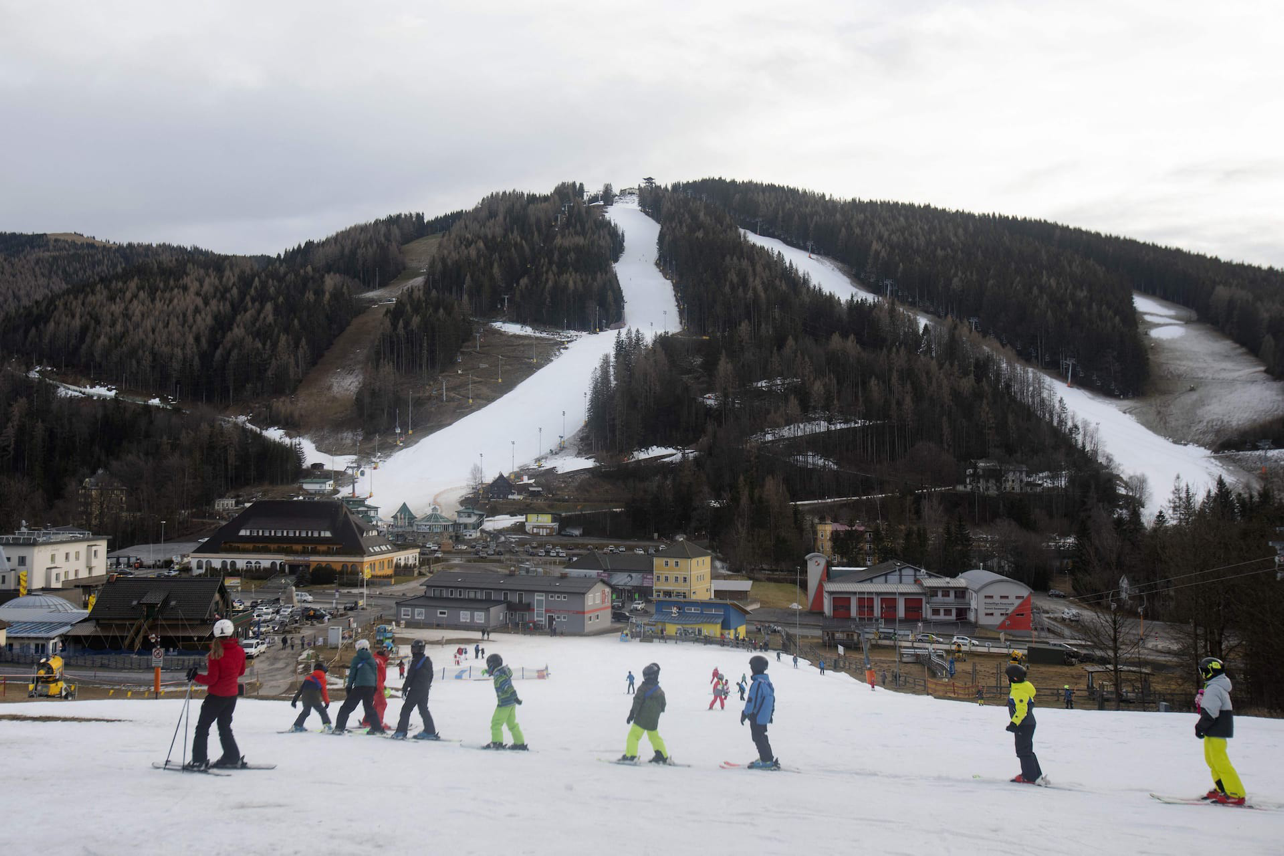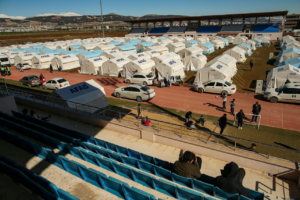LES GETS, France — With children running around inflatable cactuses and sunburned mountain bikers racing under blue skies, this French village looked like an enviable summer holidays destination last week. The problem was that nobody here had asked for it.
Not in the middle of winter, when this Alpine ski resort should have been covered by thick layers of snow, ice and even more snow.
But instead of icicle-clad chalets, visitors to this village at an altitude of almost 4,000 feet encountered muddy paths and halted lifts in recent weeks, as Europe’s unusually warm winter closed half of French slopes, forced the cancellation of winter sports competitions and left recreational skiers clamoring for refunds. It may be a preview of what is to come in a warming world, researchers worry, with averagetemperatures rising two times as fast in parts of the Alps as elsewhere.
While some tourists in Les Gets were quick to adapt to the winter heat wave — renting bikes instead of skis, ordering cold beer instead of hot mulled wine — many locals struggled to suppress a creeping feeling that this could be the beginning of the end of skiing in their part of the Alps and life as they know it.
“This is more than ‘warming,’” said Fabrice Dumaine, 52, who was waxing a pair of skis in the rental shop he operates, near a vending machine that sells cheese for raclette, a traditional après-ski meal. “It’s usually minus-5 degrees [23 degrees Fahrenheit] here at this time, and now it’s 15 degrees [59 degrees Fahrenheit]. Even some summers are colder.”
In the snowless weeks this winter, Dumaine lost about a third of his usual business.
“What’s scary,” he said, “is the uncertainty.”
Many locals hope this year could still prove to be an outlier. Even in the 1960s, some recall, there were snow-free weeks in Les Gets. Here and in many other Alpine resorts, colder temperatures and snow finally returned over the past four days.
But researchers say the trend in resorts like Les Gets is clear. Within the next seven to 17 years, skiing will become impossible “in the medium-altitude mountains, and the snow cover will inexorably decrease in the highest parts of the mountain ranges,” said Magali Reghezza-Zitt, a French geographer. By some estimates, by the end of the century, snow may have declined between 30 percent and 70 percent in the Alps, affecting even resorts that have so far been safe.
The past weeks have been “an impressive example of how the average future could look like,” said Robert Steiger, a tourism researcher at the University of Innsbruck in Austria.
In towns across the Alps, recreational skiing carries a heavy cultural value and economic weight. Since resorts were massively scaled up in the 1960s and ’70s, winter sports have been essential to the region’s economy. Almost half a million permanent or seasonal jobs depend on it in France, which shares the Alps with seven other countries that rely on the mountains for revenue.
And so, many European resorts have treated the lack of snow in recent weeks as an existential crisis. They’ve deployed snow cannons to artificially freeze water droplets into snow crystals. Some villages loaded snow piles onto trucks. A Swiss resort even attempted to fly in snow by helicopter. To the extent that any of it worked, it was only enough to cover narrow stretches that were soon featured in viral and at times dystopian videos on social media.
While artificial snow kept at least some of the slopes open in Les Gets last week, the runs were an unsatisfying experience for many. “Everyone is at the same bit of snow, and it’s really bad snow,” said Marius van Hasselt, 21, a Dutch visitor. Some of his friends headed home early.
At the same time, the frenzied efforts to keep business running at all costs are increasingly moving ski resorts into the center of a broader and particularly divisive climate debate: For how long should seemingly doomed economic sectors be allowed to continue in a warming world?
Activists celebrated when the Spanish government in 2021 banned parts of a small ski resort near Madrid from operating, citing in part a 25 percent decline in snowfall over the previous 50 years and an increasingly unjustifiable environmental footprint.
In the Alps, climate activists warn that the more frequent use of snow cannons will aggravate drought. Water is lost in the artificial snow-making process, as a result of evaporation, wind drift and other influences. And France, where some reservoirs dried up last summer, can’t afford to have that water taken out of natural circulation, activists say.
Over the past weeks, snow cannons in at least five Alpine ski resorts were sabotaged, including La Clusaz, Les Gets and Switzerland’s Verbier resort. “No skiing without snow,” read a message sprayed onto a cannon in Les Gets, next to a symbol for the climate activism group Extinction Rebellion. (The group has denied responsibility.)
Instead of trying to fix the problem with artificial snow, “it is urgently necessary to start thinking about the ecological transition of this model,” said Fiona Mille, president of environmental group Mountain Wilderness France. That could mean zip lines instead of ski lifts, summer toboggan tracks instead of winter sledding hills in low- or medium-altitude resorts.
In parts of the Alps, the end of skiing is not only near, activists argue. It is overdue.
La Clusaz Mayor Didier Thévenet said the resorts are being unfairly criticized, because it is easy to engage in “ski-bashing.”
“In the minds of people, it’s for the rich, we use water, we use energy. We’ve used cement mixers, we’ve built a lot. So, for them, we’re wrong about everything,” he said, sipping coffee in a small mountain cabin on the peak above his village, overlooking western Europe’s highest mountain, Mont Blanc, where snow is still plentiful.
“Skiing stands for everything environmentalists don’t like,” he said.
Ski resort operators point to all the environmental practices they have adopted: reducing their use of polluting snow groomer fuel, and encouraging tourists to arrive on sleek high-speed trains instead of cars that clog the mountain roads.
“We’re convinced that there is a path for a reasonable operation of ski areas in harmony with nature,” said Laurent Reynaud, who represents France’s association of ski areas.
Officials in La Clusaz acknowledge that they will need to expand their use of snow cannons to remain profitable in the coming years. But the village recently cited environmental concerns in rejecting a major hotel chain’s lucrative offer to build a new resort. Officials have been working to develop a bigger summer tourism sector, while exploring the potential closure of ski slopes that are particularly vulnerable in warm winters.
“What we ask the public and the [environmental] associations is to give us time to work with elected officials, engineers, experts and consultants, to bring about this evolution of our economic model,” said Jean-Philippe Monfort, head of the village’s tourism office.
But there may be economic and technological limits to how much and how quickly villages like La Clusaz can adapt. Skiers spend far more on lift passes and equipment rentals than hikers contribute to the local economy.
“We will have less money, and we will probably lower our standard of living,” Thévenet said.
Already, some of the economic pain is being felt.
Nicolas Chauvin, 23, one of tens of thousands of seasonal workers in French ski resorts, was supposed to start working as a waiter in La Clusaz in late November. But he had to rely on unemployment benefits during a no-snow delay, and when he finally arrived in the village on Saturday, rolling his suitcase over the snow-free road, he wasn’t sure if the wait had been worth it.
“The cable car cabins are all empty,” he said, staring at the lift in front of him with disappointment.
Climate change has upended his life more than once over the past years. When he was working at a beach resort restaurant during the summer, record heat waves across Europe kept the majority of tables empty for weeks.
“I’m only 23 years old, but within the past 10 years, it has all completely changed,” he said. “We need to reinvent everything.”




